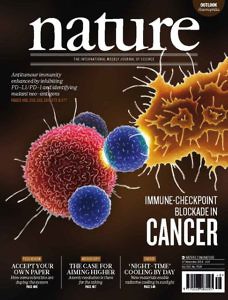The Science of PD1 PDL1 Cancer Immunotherapy
 In a landmark publication today, the prestigious journal Nature includes five “Letters” regarding checkpoint blockade of the programmed death-1 (PD-1) receptor and its ligand PD-L1. It confirms the promise and potential of the emerging field of immuno-oncology to provide durable and long lasting responses in many cancers.
In a landmark publication today, the prestigious journal Nature includes five “Letters” regarding checkpoint blockade of the programmed death-1 (PD-1) receptor and its ligand PD-L1. It confirms the promise and potential of the emerging field of immuno-oncology to provide durable and long lasting responses in many cancers.
Readers of the blog will already have read about the stunning early data presented at ASCO this year for the engineered humanized antibody MPDL3280A (Genentech/Roche) in urothelial bladder cancer (UBC). In his Nature Letter, Thomas Powles (Barts) and colleagues sum of the significance of this data in the opening sentence:
“There have been no major advances for the treatment of metastatic urothelial bladder cancer (UBC) in the last 30 years.”
On the basis of this data, MPDL3280A received Breaththrough Therapy Designation from the FDA earlier this year.
Roy Herbst (Yale) and colleagues in their Nature Letter write about biomakers of PD-L1 inhibition and how their data “suggest that MPDL3280A is most effective in patients in which pre-existing immunity is suppressed by PD-L1, and is reinvigorated on antibody treatment.”
At the recent annual meeting of the Society for Immunotherapy of Cancer (SITC), Dr Herbst gave one of the best presentations of the meeting, in which he discussed “Personalized Immunotherapy for Non-Small Cell Lung Cancer.” His top ten lessons learned kept the audience’s attention throughout.
Tomorrow is the Thanksgiving holiday in the United States, so this will be the only post this week. Thanksgiving is a good time to take a moment out of the hectic life we all live to “smell the roses” and express gratitude for all the positive things around us.
Next week sees the start of the American Society of Hematology (ASH) annual meeting in San Francisco. The cancer conference circuit seems to roll quickly from one meeting to the next at the moment. There’s a lot of promising data, and while we can’t discuss the data before the meeting due to ASH embargo restrictions, next week we will be highlighting some of the presentations we are particularly looking forward to.
Happy Thanksgiving!
Subscribers can login to read more detail about all five Nature Letters, and their implications for the emerging field of immuno-oncology.
This content is restricted to subscribers